Are you curious about homestay associations or cooperatives in Vietnam for your upcoming trip? This guide by SIXT.VN will delve into the world of Vietnamese homestays, providing essential insights for travelers. Discover how these associations can enhance your travel experience by offering authentic cultural immersion and reliable accommodation options. If you’re looking for unique accommodations, consider exploring eco-lodges, farm stays, and guesthouses in Vietnam, all easily accessible through our travel booking platform.
1. What Role Do Homestay Associations and Cooperatives Play in Vietnam’s Tourism Sector?
Homestay associations and cooperatives in Vietnam play a crucial role in promoting sustainable tourism, preserving local culture, and improving the livelihoods of local communities. They act as a bridge between tourists and local families, ensuring quality services and authentic experiences.
- Economic Empowerment: These associations empower local families by providing them with the necessary resources, training, and marketing support to run successful homestays.
- Cultural Preservation: By encouraging cultural exchange and promoting traditional practices, they help preserve Vietnam’s rich cultural heritage.
- Quality Assurance: Associations often set standards for hygiene, safety, and service quality, ensuring a positive experience for tourists.
- Community Development: Revenue generated from tourism is often reinvested in community projects, contributing to the overall development of the area.
These associations not only enhance the tourist experience but also contribute to the sustainable development of the regions where they operate, fostering a harmonious relationship between tourism and local communities.
2. Where Can I Find Homestay Associations or Cooperatives in Vietnam?
Homestay associations and cooperatives are primarily located in popular tourist destinations and rural areas known for their unique cultural heritage. Some notable regions include Sapa, Mai Chau, and the Mekong Delta.
- Sapa: Known for its stunning rice terraces and ethnic minority cultures, Sapa has numerous homestay associations that connect travelers with local Hmong and Dao families.
- Mai Chau: This valley offers a peaceful escape with its traditional stilt houses and lush landscapes. Homestay cooperatives here focus on sustainable tourism practices.
- Mekong Delta: Explore the vibrant waterways and sample the local cuisine by staying in a homestay organized by regional cooperatives.
To find these associations, you can check local tourism websites, visitor centers, or online travel platforms. SIXT.VN also offers curated lists of homestays verified by local associations, ensuring a reliable and authentic experience.
3. What Are the Benefits of Booking a Homestay Through an Association or Cooperative?
Booking a homestay through an association or cooperative provides several advantages, including guaranteed quality, authentic experiences, and direct support to the local community.
- Quality Assurance: Homestays affiliated with associations often adhere to specific standards of hygiene, safety, and service, ensuring a comfortable stay.
- Authentic Cultural Immersion: You’ll have the opportunity to live with local families, participate in their daily activities, and learn about their traditions firsthand.
- Community Support: Your booking directly benefits the local community, as a significant portion of the revenue goes directly to the homestay owners and community projects.
- Local Insights: You’ll gain valuable insights into the local culture, customs, and attractions from your hosts, enhancing your travel experience.
By booking through an association or cooperative, you are not just securing accommodation but also contributing to the sustainable development of the community and fostering a more meaningful travel experience.
4. How Do Homestay Associations Ensure Quality and Safety?
Homestay associations ensure quality and safety through a variety of measures, including regular inspections, training programs, and implementing standardized guidelines.
- Regular Inspections: Associations conduct regular inspections to ensure that homestays meet specific criteria for hygiene, safety, and comfort.
- Training Programs: Homestay owners and staff receive training in hospitality, customer service, and safety protocols to enhance the overall guest experience.
- Standardized Guidelines: Associations establish clear guidelines for pricing, amenities, and services to maintain consistency and transparency.
- Guest Feedback: Many associations collect guest feedback and use it to identify areas for improvement and ensure that homestays continue to meet expectations.
These measures help maintain a high standard of quality and safety, providing travelers with peace of mind and a comfortable stay.
5. What Types of Activities and Experiences Can I Expect at a Homestay Organized by an Association?
At a homestay organized by an association, you can expect a variety of activities and experiences that provide authentic insights into local culture and daily life.
- Cooking Classes: Learn how to prepare traditional Vietnamese dishes using local ingredients.
- Farming Activities: Participate in agricultural activities such as planting rice, harvesting crops, or tending to livestock.
- Cultural Performances: Enjoy traditional music, dance, and storytelling performances by local artists.
- Craft Workshops: Learn traditional crafts such as weaving, pottery, or embroidery from skilled artisans.
- Guided Tours: Explore the surrounding area with a local guide who can provide insights into the history, culture, and natural beauty of the region.
These activities offer a unique opportunity to immerse yourself in the local culture and create lasting memories.
6. How Do Homestay Cooperatives Support Local Communities Economically?
Homestay cooperatives support local communities economically by providing income opportunities, promoting local products, and investing in community development projects.
- Income Generation: Homestays provide a direct source of income for local families, improving their standard of living and reducing poverty.
- Promotion of Local Products: Cooperatives often promote the sale of local products such as handicrafts, textiles, and agricultural produce, creating additional income streams for community members.
- Community Development Projects: Revenue generated from tourism is often reinvested in community projects such as building schools, improving infrastructure, and providing healthcare services.
- Skill Development: Cooperatives provide training and support to help community members develop the skills needed to run successful businesses and participate in the tourism industry.
By supporting local communities economically, homestay cooperatives contribute to the sustainable development of the region and help preserve its unique cultural heritage.
7. Are There Any Specific Homestay Associations Focused on Ecotourism in Vietnam?
Yes, several homestay associations in Vietnam focus specifically on ecotourism, promoting sustainable practices and responsible travel.
- Sustainable Tourism Standards: These associations ensure that homestays adhere to strict environmental standards, such as minimizing waste, conserving water, and using renewable energy sources.
- Community Involvement: Ecotourism homestays actively involve local communities in tourism activities, providing them with income opportunities and empowering them to protect their natural resources.
- Environmental Education: These homestays educate guests about the importance of environmental conservation and encourage them to adopt sustainable practices during their stay.
Some notable examples include homestays in national parks and nature reserves, where guests can participate in activities such as hiking, birdwatching, and wildlife conservation.
8. What Should I Look For When Choosing a Homestay Association or Cooperative?
When choosing a homestay association or cooperative, consider factors such as reputation, transparency, community involvement, and sustainability practices.
- Reputation: Research the association’s reputation by reading reviews and testimonials from previous guests.
- Transparency: Choose an association that is transparent about its operations, including how revenue is distributed and how decisions are made.
- Community Involvement: Look for an association that actively involves local communities in tourism activities and supports community development projects.
- Sustainability Practices: Choose an association that promotes sustainable practices, such as minimizing environmental impact and preserving cultural heritage.
- Certifications: Check if the association has any certifications or awards that recognize its commitment to quality and sustainability.
By considering these factors, you can choose a homestay association or cooperative that aligns with your values and provides a rewarding travel experience.
9. How Can I Ensure the Homestay Is Authentic and Respectful of Local Culture?
To ensure that your homestay experience is authentic and respectful of local culture, it is essential to do your research, communicate with your hosts, and be mindful of local customs.
- Research: Learn about the local culture, traditions, and customs before your arrival.
- Communication: Communicate with your hosts to understand their expectations and any guidelines you should follow.
- Respect: Be respectful of local customs and traditions, such as dress codes, religious practices, and social etiquette.
- Participation: Participate in local activities and events to learn about the culture firsthand.
- Support: Support local businesses and initiatives by purchasing local products and services.
By being mindful and respectful, you can ensure that your homestay experience is both authentic and beneficial to the local community.
10. What Are Some Common Misconceptions About Homestays in Vietnam?
There are several common misconceptions about homestays in Vietnam that travelers should be aware of before booking their stay.
- Misconception: Homestays are always basic and uncomfortable.
- Reality: While some homestays may be simple, many offer comfortable accommodations with modern amenities.
- Misconception: Homestays are only for budget travelers.
- Reality: Homestays cater to a range of travelers, from budget backpackers to those seeking a more luxurious experience.
- Misconception: Homestays are only available in rural areas.
- Reality: Homestays can be found in both rural and urban areas, offering a variety of experiences.
- Misconception: Homestays lack privacy.
- Reality: While you will be living with a local family, homestays typically offer private rooms and bathrooms.
By dispelling these misconceptions, travelers can approach homestays with a more open mind and appreciate the unique benefits they offer.
11. How Can SIXT.VN Help Me Find and Book a Reliable Homestay in Vietnam?
SIXT.VN offers a seamless platform to find and book reliable homestays in Vietnam, ensuring a safe, authentic, and memorable travel experience.
- Curated Selection: SIXT.VN provides a curated selection of homestays verified by local associations, ensuring quality and authenticity.
- Detailed Information: Each homestay listing includes detailed information about amenities, activities, and local attractions.
- User Reviews: Read reviews from previous guests to get an insight into the homestay experience.
- Secure Booking: SIXT.VN offers a secure booking platform with various payment options.
- Customer Support: Our dedicated customer support team is available to assist you with any questions or concerns.
With SIXT.VN, you can easily find and book a homestay that meets your needs and preferences, ensuring a hassle-free and enriching travel experience in Vietnam.
12. What Are the Legal and Regulatory Considerations for Homestays in Vietnam?
Homestays in Vietnam are subject to certain legal and regulatory considerations to ensure safety, quality, and compliance with local laws.
- Licensing: Homestays are required to obtain a license from the local tourism authority.
- Safety Standards: Homestays must comply with safety standards, including fire safety, hygiene, and food safety regulations.
- Taxation: Homestay owners are required to pay taxes on their income from tourism activities.
- Registration: Homestays must register guests with the local police or authorities.
It’s important for homestay owners to comply with these regulations to ensure the safety and well-being of their guests and to operate legally within Vietnam.
13. How Has the COVID-19 Pandemic Affected Homestay Associations in Vietnam?
The COVID-19 pandemic has significantly affected homestay associations in Vietnam, leading to decreased tourism, financial challenges, and the need for adaptation.
- Decreased Tourism: Travel restrictions and lockdowns have resulted in a sharp decline in tourism, impacting the income of homestay owners and communities.
- Financial Challenges: Many homestay associations have faced financial difficulties due to reduced revenue and increased operating costs.
- Adaptation: To mitigate the impact of the pandemic, homestay associations have implemented new safety protocols, offered virtual tours, and focused on domestic tourism.
As the tourism industry recovers, homestay associations will play a crucial role in promoting sustainable and responsible tourism practices.
14. What Measures Are Homestay Associations Taking to Ensure Guest Safety During the Pandemic?
Homestay associations in Vietnam are taking various measures to ensure guest safety during the pandemic, including implementing hygiene protocols, providing personal protective equipment, and offering flexible booking policies.
- Hygiene Protocols: Homestays are required to follow strict hygiene protocols, including regular cleaning and disinfection of rooms and common areas.
- Personal Protective Equipment: Homestay owners and staff are provided with personal protective equipment such as masks, gloves, and hand sanitizer.
- Social Distancing: Measures are taken to ensure social distancing, such as limiting the number of guests and spacing out tables in dining areas.
- Flexible Booking Policies: Homestays offer flexible booking policies, allowing guests to change or cancel their reservations without penalty.
- Health Screening: Guests may be required to undergo health screening upon arrival, such as temperature checks and health declarations.
These measures help create a safe and healthy environment for guests and staff, ensuring a comfortable and worry-free stay.
15. Can I Participate in Volunteer Activities Through Homestay Associations?
Yes, many homestay associations offer opportunities to participate in volunteer activities, allowing you to contribute to local communities and make a positive impact.
- Teaching English: Volunteer to teach English to local children or adults.
- Environmental Conservation: Participate in environmental conservation activities such as tree planting, waste cleanup, or wildlife protection.
- Community Development: Assist with community development projects such as building schools, repairing infrastructure, or providing healthcare services.
- Cultural Exchange: Share your culture and skills with local communities through workshops, demonstrations, or cultural performances.
These volunteer opportunities provide a meaningful way to connect with local communities and contribute to their sustainable development.
16. What Are Some Examples of Successful Homestay Cooperatives in Vietnam?
Several homestay cooperatives in Vietnam have achieved success by providing quality services, promoting sustainable tourism, and supporting local communities.
- Sapa O Chau: Located in Sapa, this cooperative offers authentic homestay experiences with local Hmong families, promoting cultural preservation and community development.
- Hoa Binh Community Tourism: This cooperative in Hoa Binh province focuses on sustainable tourism practices, providing income opportunities for local communities and protecting the environment.
- Mekong Delta Homestay Association: This association in the Mekong Delta offers homestay experiences with local families, promoting the region’s unique culture and cuisine.
These successful cooperatives serve as models for other homestay initiatives in Vietnam, demonstrating the potential for tourism to contribute to sustainable development and community empowerment.
17. How Do Homestay Associations Handle Complaints or Disputes?
Homestay associations typically have a system in place to handle complaints or disputes between guests and homestay owners, ensuring fair and timely resolution.
- Mediation: Associations often act as mediators to facilitate communication and resolve disputes amicably.
- Investigation: Associations may conduct investigations to gather information and determine the facts of the case.
- Resolution: Associations may offer solutions such as refunds, compensation, or alternative accommodation arrangements.
- Escalation: If a resolution cannot be reached, the association may escalate the matter to the local tourism authority or other relevant agencies.
By having a clear process for handling complaints and disputes, homestay associations demonstrate their commitment to customer satisfaction and quality service.
18. What Role Do Technology and Online Platforms Play in Promoting Homestays in Vietnam?
Technology and online platforms play a significant role in promoting homestays in Vietnam, making it easier for travelers to find and book accommodations, and for homestay owners to reach a wider audience.
- Online Booking Platforms: Platforms such as SIXT.VN, Booking.com, and Airbnb allow travelers to easily search for and book homestays in Vietnam.
- Social Media: Social media platforms such as Facebook, Instagram, and YouTube are used to promote homestays and showcase their unique features and experiences.
- Website Development: Homestay associations and owners create websites to provide information about their accommodations, activities, and services.
- Online Marketing: Digital marketing techniques such as search engine optimization (SEO) and social media advertising are used to attract potential guests.
By leveraging technology and online platforms, homestays in Vietnam can increase their visibility, attract more guests, and contribute to the growth of the tourism industry.
19. What Are the Future Trends for Homestay Associations in Vietnam?
The future trends for homestay associations in Vietnam include a greater focus on sustainability, technology integration, and personalized experiences.
- Sustainability: Homestay associations will increasingly prioritize sustainability practices, such as reducing environmental impact and supporting local communities.
- Technology Integration: Technology will play a greater role in promoting and managing homestays, with the use of online booking platforms, mobile apps, and smart home technologies.
- Personalized Experiences: Homestays will offer more personalized experiences, catering to the individual needs and preferences of guests.
- Community Empowerment: Homestay associations will continue to empower local communities by providing income opportunities, training, and support.
- Collaboration: Increased collaboration between homestay associations, government agencies, and private sector partners will be essential for the sustainable development of the tourism industry.
By embracing these trends, homestay associations in Vietnam can continue to thrive and contribute to the country’s economic and social development.
20. How Can I Start My Own Homestay and Join an Association in Vietnam?
Starting your own homestay and joining an association in Vietnam requires careful planning, compliance with local regulations, and a commitment to providing quality services.
- Research: Research the local market, identify your target audience, and develop a business plan.
- Licensing: Obtain the necessary licenses and permits from the local tourism authority.
- Property Development: Develop or renovate your property to meet the required standards for safety, hygiene, and comfort.
- Training: Attend training programs to learn about hospitality, customer service, and sustainable tourism practices.
- Association Membership: Join a reputable homestay association to gain access to resources, training, and marketing support.
- Online Promotion: Promote your homestay online through websites, social media, and online booking platforms.
By following these steps, you can start your own homestay and contribute to the growth of the tourism industry in Vietnam.
In conclusion, homestay associations and cooperatives are vital components of Vietnam’s tourism landscape, offering authentic cultural experiences and supporting local communities. When planning your trip, consider booking a homestay through SIXT.VN to ensure a reliable and rewarding experience. Explore Vietnam’s unique accommodations, from eco-lodges to farm stays, and immerse yourself in the local culture.
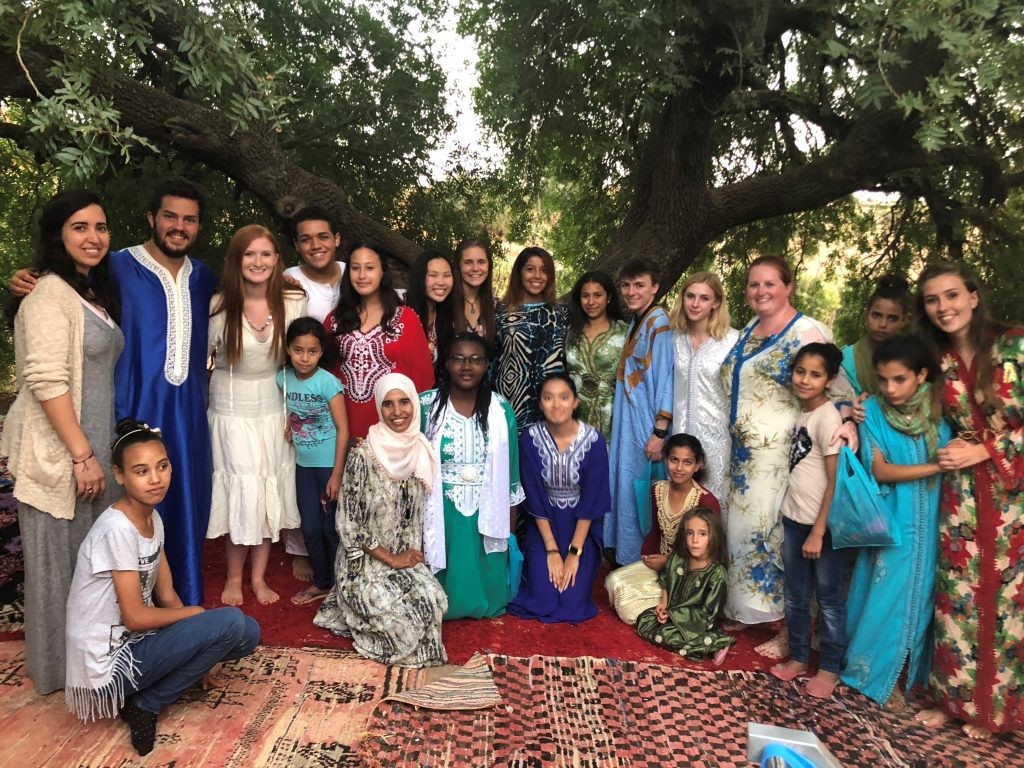 A welcoming homestay in a rural Vietnamese village, showcasing the traditional architecture and warm hospitality
A welcoming homestay in a rural Vietnamese village, showcasing the traditional architecture and warm hospitality
Discovering Tranquility and Connection in a Vietnamese Village Homestay
Upon arriving in a serene Vietnamese village, I was immediately enveloped in an atmosphere of warmth and genuine hospitality. Our group was greeted with open arms and radiant smiles, setting the tone for an unforgettable experience. My homestay family welcomed me into their home with delicious traditional food and heartfelt embraces. We shared countless moments of laughter, and I found immense joy in assisting them with daily tasks like washing clothes, making m’simmen, and watering the lush greenery. The time spent in this village imparted invaluable life lessons, reminding me of the simple joys often overlooked in the fast-paced world I inhabit back in America. The absence of constant connectivity to my phone and social media allowed me to fully appreciate the profound impact of a loving and supportive community. There’s an indescribable sense of peace in simply savoring each moment and engaging in meaningful conversations with the people around me. The community service our group participated in instilled a deep sense of purpose. We contributed to molding adobe bricks for building homes, painting the cooperative where local women prepare couscous, and planting trees throughout the village on two separate occasions. I’ve always believed in leaving a place better than I found it, and I sincerely hope that’s what I’ve accomplished here. I’m incredibly grateful for the opportunity to have spent time in this remarkable place and to have gained a newfound appreciation for a different way of life.
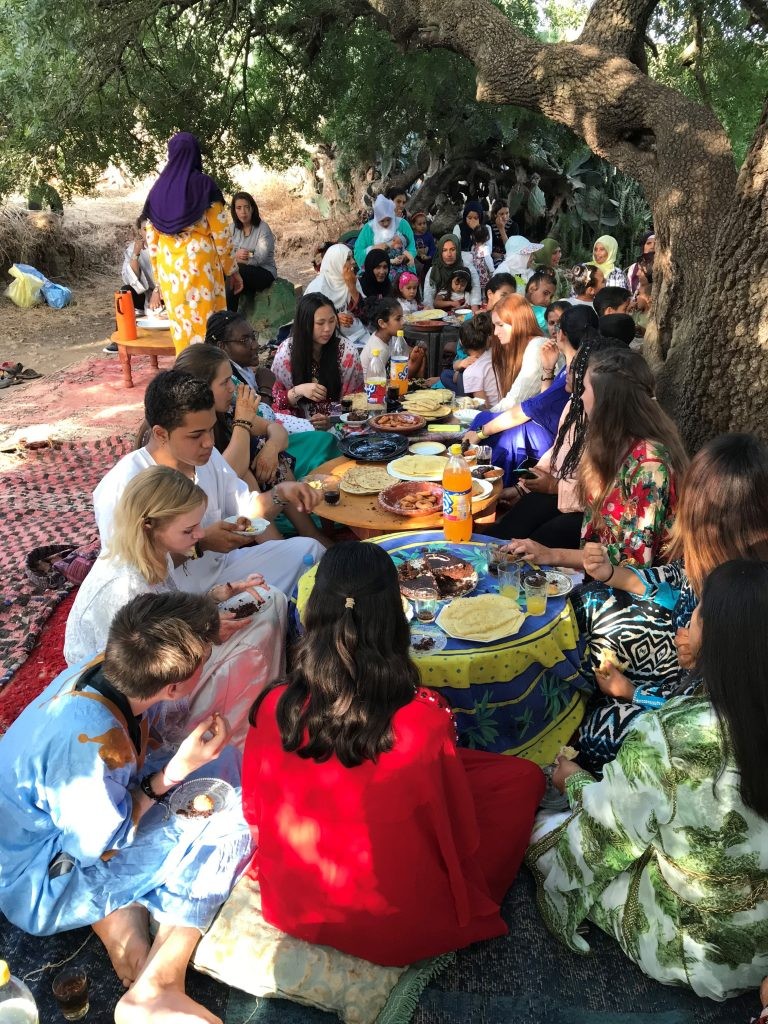 A young traveler assisting a local Vietnamese family with traditional weaving, showcasing the cultural exchange and learning
A young traveler assisting a local Vietnamese family with traditional weaving, showcasing the cultural exchange and learning
Embracing the Rhythm of Village Life and Authentic Cultural Immersion
Village life unfolds at a pace and rhythm entirely foreign to our modern sensibilities. Afternoon naps aren’t just encouraged; they’re an integral part of the daily routine for many villagers. This newfound downtime has allowed us to journal, engage in group games, and play with the children. It’s been immensely beneficial for our entire group to ground ourselves in new ways, momentarily detaching from the constant concerns about Wi-Fi or college applications (though we’re not quite fully there yet). We begin our mornings under the expansive canopy of a large, shaded tree, which has affectionately become known as “the tree.” Most of these mornings start with the intricate art of weaving. Seated on a colorful array of woven carpets spread beneath “the tree,” the weavers patiently impart their skills to us, a few at a time. Their expertise, honed over years of practice, has become second nature to them. In our initial attempts, many of our efforts were met with a gentle “la” or “no” as we tangled the strings or missed crucial steps. However, with more weaving and bezef (much) patience, we began to hear sounds of congratulations paired with warm claps and smiles from the weavers. As we spend more time with them, the weavers, in their creative ways, ask us about our host families and our families back home. They helped me solidify my counting skills in Darija, counting the strings alongside me as I weaved. Beyond weaving, we also have the privilege of participating in cooking lessons, where we learn to prepare traditional Moroccan dishes. Our culinary skills are far from those of the women who teach us. Our M’simmen often looks a little lumpier, and our vegetables appear wobbly and thin compared to their expertly crafted dishes. Nevertheless, our enthusiastic attempts are met with equal enthusiasm from the women, who are delighted to see us trying our best. When the meals are ready, we gather under “the tree” to eat, sharing the food “family style” as a group. One of the women who helps us with the cooking is my host mom. She always makes sure to wave when I pass her at work and tries extra hard to help me improve my potato peeling skills, which, despite her gracious efforts, have yet to see vast improvement. She invites me to join her for lunch with the other women each day, where we share breaks together to eat tagine. The women, both the weavers and the cooks, work at the Cooperative, an association dedicated to helping local women generate income and support the village economy. At the Cooperative, the weavers and cooks (who typically cook couscous) sell their wares. They generously spare their time to help us, and we couldn’t be more grateful. This simple, patient, and easygoing approach isn’t unique to the women of the Cooperative; it’s present every day with our families, neighbors, friends, and even strangers. We may not speak perfect Darija, or rather, much Darija at all, but that hasn’t stopped us from having wonderful times with everyone here. My host sister and I dance in bed when we wake up, and my family here in Vietnam loves to see pictures of my family back home. We’ve learned as a group that a smile and a quick salam (hello) can do wonders to brighten a day, and many of us greet each person we pass in the small village. Life may move at a slower pace here, but we also find it to be a life more closely aligned with happiness than we’ve experienced before. I know that I, as well as my group mates, will all carry a small piece of this community, in the form of kindness, back to our homes.
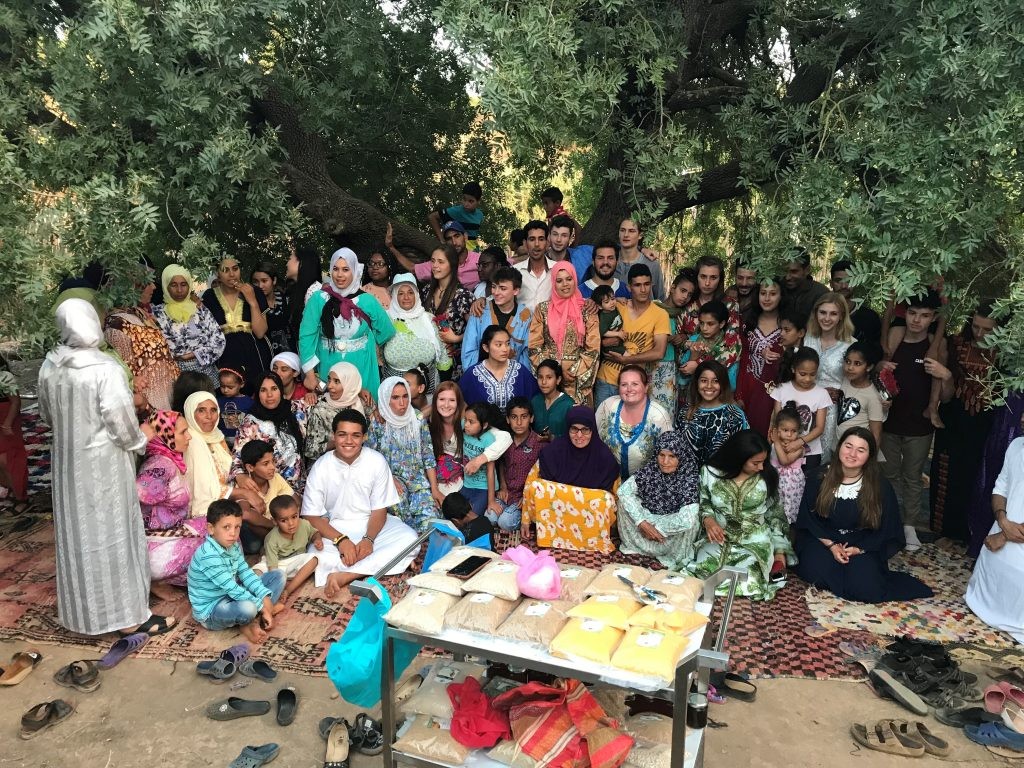 Local Vietnamese women weaving traditional textiles in a cooperative setting, highlighting the economic empowerment and cultural preservation
Local Vietnamese women weaving traditional textiles in a cooperative setting, highlighting the economic empowerment and cultural preservation
Bridging Urban and Rural Experiences: A Homestay Souk Adventure
Heading into the homestay portion of our journey, I was filled with anticipation and a touch of uncertainty. I knew it would likely be drastically different from our time spent in hotels in bustling urban areas, but I couldn’t fully grasp the extent of the change. As we navigated the winding mountain roads on our way to the small village of Bojouda, I realized I was in for an experience unlike any I’d encountered before. As I’d predicted, there were few similarities between our travels through cities like Hanoi and Ho Chi Minh City and our time in the village. Gone were the crowded streets teeming with eager drivers; in their place were slow-moving donkey carts and the occasional taxi. Instead of enthusiastic vendors on every street corner, we were greeted by gentle villagers who spent their days weaving, cooking, or working in the nearby town. One common thread between our urban and rural experiences emerged about a week into our village stay when we visited the local souk with our host families. The small but bustling market — filled with everything from fresh produce to Western apparel to newly butchered livestock — was reminiscent of the medinas we’d visited in the cities, though with a much stronger sense of community. Everywhere I went throughout the souk with my host brother, he found someone he knew and greeted them warmly, even if he’d seen them just the day before. As we moved from shop to shop, I felt a familiar vibrant energy that has characterized much of our trip throughout the country. During my time in the souk, I was struck by the ties that bind the rural to the urban, that bind Hanoi to Bojouda, that bind the fast-paced to the relaxed, despite the obvious differences between them. The theme of our trip is cultural exchange, which we’ve indeed witnessed firsthand, but I’ve been equally impacted by the similarities that abound throughout Vietnam, no matter where one goes. The high-energy marketplace seems to me to be a staple of the nation, and one that has helped me — and, I’d argue, our entire group — to gain a meaningful and in-depth look at Vietnamese life and culture.
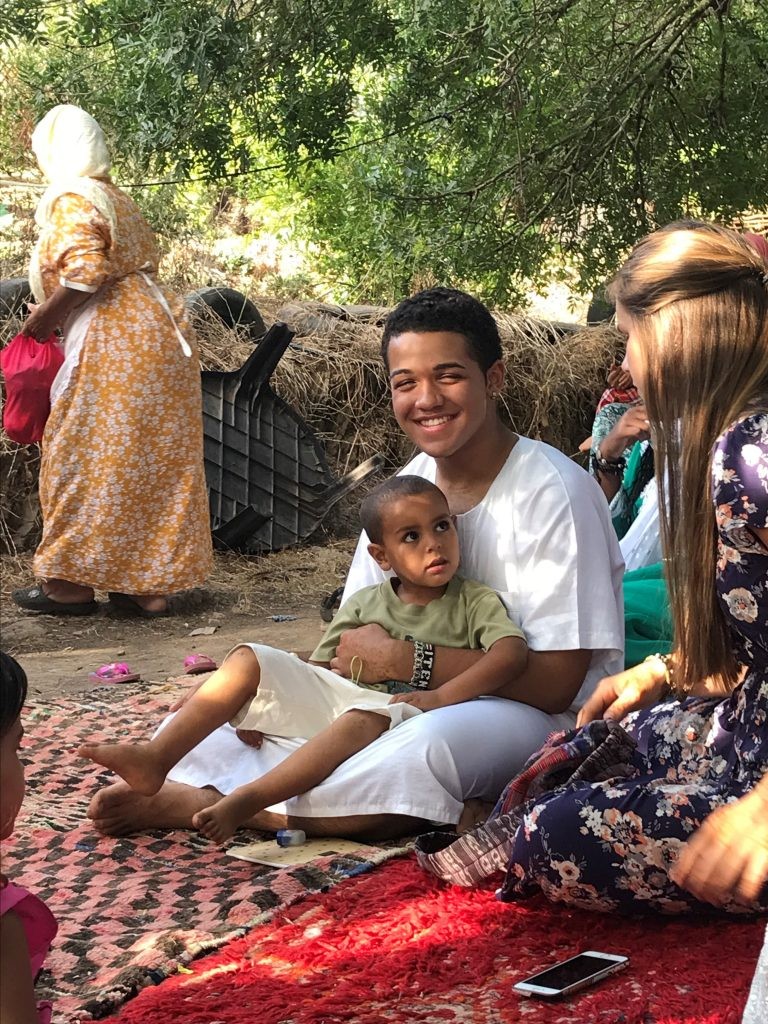 A bustling local market in a Vietnamese village, showcasing the vibrant community and local produce
A bustling local market in a Vietnamese village, showcasing the vibrant community and local produce
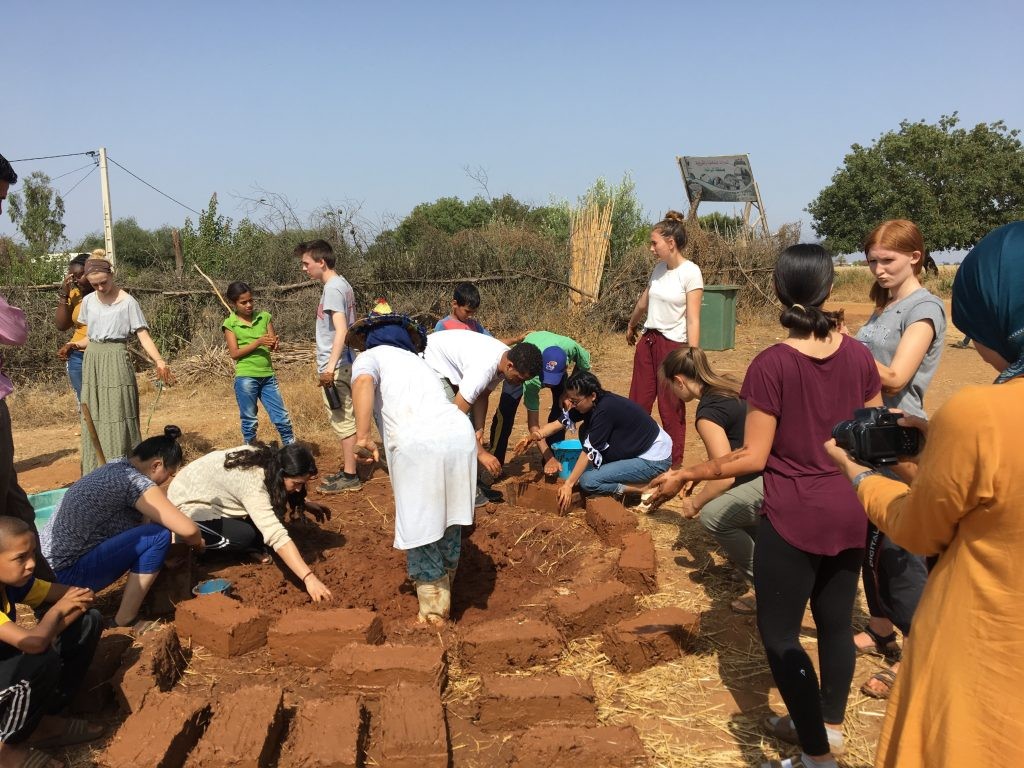 A group of travelers enjoying a meal with their Vietnamese homestay family, highlighting the cultural exchange and personal connections
A group of travelers enjoying a meal with their Vietnamese homestay family, highlighting the cultural exchange and personal connections
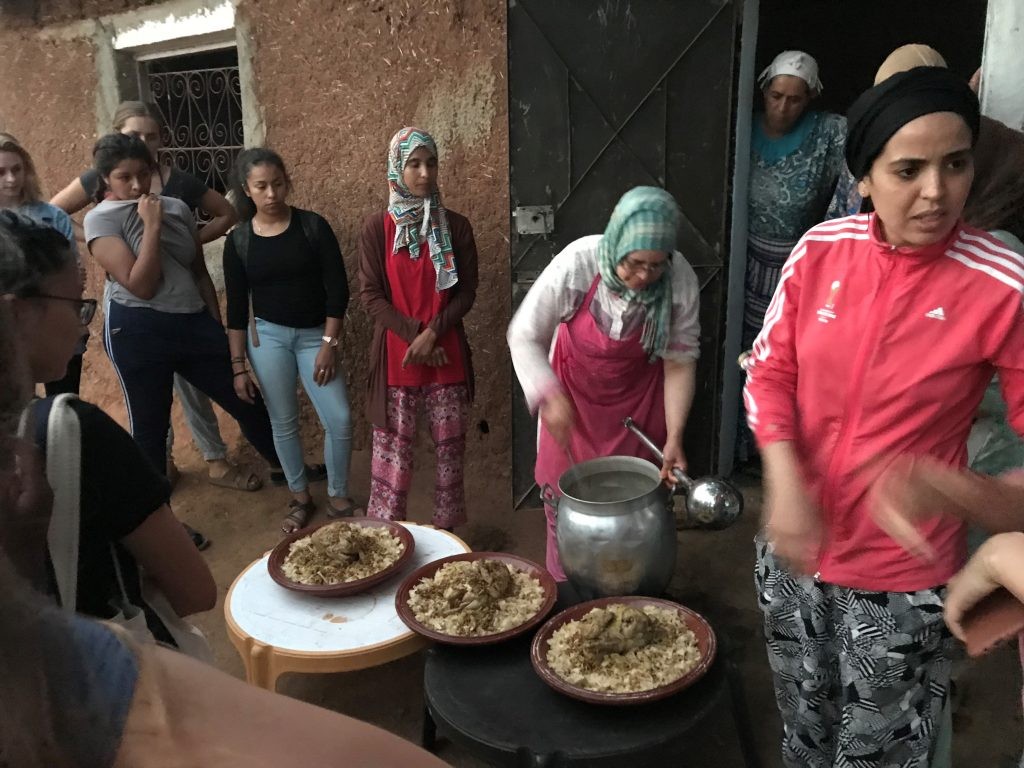 Travelers planting trees in a Vietnamese village as part of a community service project, showcasing sustainable tourism and environmental responsibility
Travelers planting trees in a Vietnamese village as part of a community service project, showcasing sustainable tourism and environmental responsibility
FAQ About Homestay Associations and Cooperatives in Vietnam
1. What is the primary goal of homestay associations in Vietnam?
The primary goal of homestay associations in Vietnam is to promote sustainable tourism, preserve local culture, and improve the livelihoods of local communities by connecting travelers with authentic homestay experiences.
2. How do I know if a homestay in Vietnam is part of a reputable association?
You can verify if a homestay is part of a reputable association by checking local tourism websites, visitor centers, or online travel platforms like SIXT.VN, which often list verified homestays.
3. What kind of training do homestay owners receive through associations?
Homestay owners receive training in hospitality, customer service, safety protocols, hygiene standards, and sustainable tourism practices to enhance the guest experience.
4. Can I expect English-speaking hosts at homestays affiliated with associations?
While not always guaranteed, many homestays affiliated with associations have hosts who speak some English, and associations often provide language training to improve communication with international guests.
5. Are homestays in Vietnam suitable for families with children?
Yes, many homestays in Vietnam are suitable for families with children, offering family-friendly accommodations and activities that cater to all ages.
6. How do homestay cooperatives ensure that revenue benefits the entire community?
Homestay cooperatives ensure that revenue benefits the entire community by reinvesting a portion of the earnings into community development projects such as schools, infrastructure, and healthcare services.
7. What types of cultural activities can I participate in at a homestay in Vietnam?
At a homestay in Vietnam, you can participate in cultural activities such as cooking classes, farming activities, traditional music and dance performances, and craft workshops.
8. How do homestay associations address environmental concerns?
Homestay associations address environmental concerns by promoting sustainable practices, such as minimizing waste, conserving water, using renewable energy sources, and encouraging responsible tourism.
9. What is the best time of year to visit homestays in Vietnam?
The best time of year to visit homestays in Vietnam depends on the region, but generally, the dry season (November to April) is ideal for Northern Vietnam, while the dry season (December to May) is best for Southern Vietnam.
10. How can I support local communities while staying at a homestay in Vietnam?
You can support local communities by purchasing local products and services, participating in community activities, respecting local customs and traditions, and choosing homestays that are affiliated with reputable associations and cooperatives.
Ready to explore the authentic beauty of Vietnam? Let SIXT.VN be your trusted travel companion. We offer expert advice, seamless airport transfers, handpicked hotel options, exciting tour bookings, and affordable flight tickets. Contact us today to start planning your dream Vietnamese adventure!
Address: 260 Cau Giay, Hanoi, Vietnam
Hotline/Whatsapp: +84 986 244 358
Website: SIXT.VN



